Account of the main events in the Israel-Hamas war and hostilities by the Iranian Axis
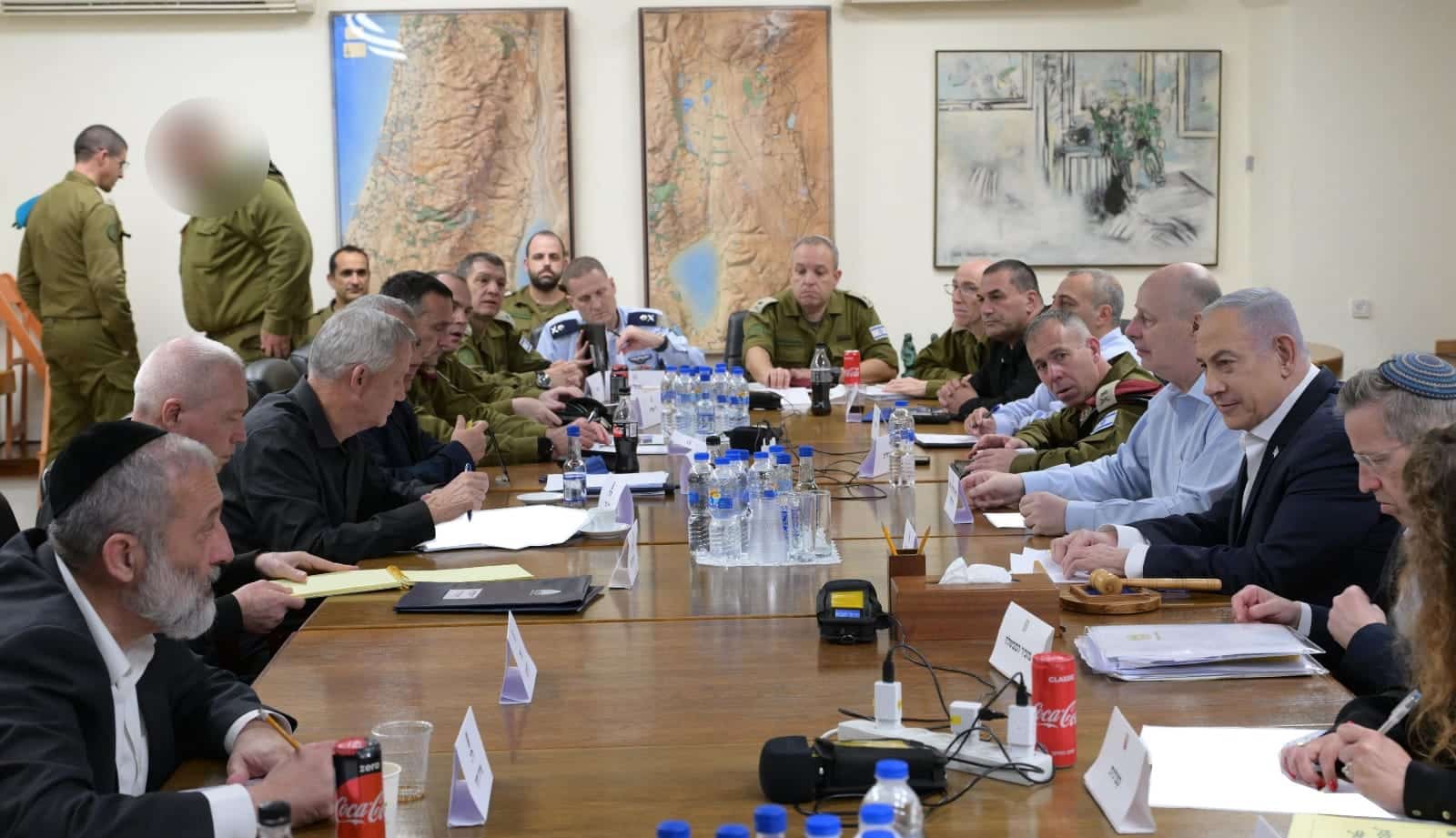
Overview
- Israel is believed to have attacked Iran directly late Thursday night and into the early hours Friday morning coinciding with Iranian Supreme Leader, Ali Khamenei’ birthday. Washington has denied that it was informed of the attack in advance. Iran through its various media channels, which double as government mouthpieces, have been playing down the attack.
- Qatar’s Prime Minister, Mohammad bin Abdulrahman Al-Thani, stated that Qatar is “reassessing its role as a mediator between Israel and Gaza.”
- Turkey’s President Recep Tayyip Erdogan and Hamas chief Ismail Haniyeh met in Istanbul. There are reports that Turkey is considered a likely host country for Hamas’ political bureau should Qatar expel it.
- The United States vetoed the UN resolution recognizing Palestine as full UN member state.
- The Biden Administration is advancing a long-term diplomatic agreement in the coming months and is pressuring Prime Minister Benjamin Netanyahu to commit to the establishment of a Palestinian state – in exchange for diplomatic recognition from Riyadh.
Iran
Israel’s Response to the Iranian Attack
A very dramatic week began with an Iranian missile and drone attack that impacted Israel at around 1:30 am Sunday, April 14, which included interception efforts and cooperation from an international coalition that rallied around Israel. For the first time in history, this included Arab countries like Jordan and Saudi Arabia, who opened their skies and helped gather significant intelligence before the attack. Conversely, Iran stated that they intended to ’move the goalposts,’ essentially normalizing attacks of this kind against Israel. Ismail Al-Khatib, the Iranian Intelligence Minister, stated, “The attack on Israel is the beginning of a new strategy for Iran.”
Israel is believed to have attacked Iran on Thursday night and into the early hours Friday morning, coinciding with Iranian Supreme Leader, Ali Khamenei’ birthday. Washington has denied that it was informed of the attack in advance, with Secretary of State Antony Blinken stating, “the United States has not been involved in any offensive operations.” Based on the Iranian response and the limited nature of the attack, it seems like it was planned to resolve this spiraling situation and avoid further escalation.
According to sources in the New York Times, the attack included missiles from Israeli jets that managed to penetrate Iranian air defense with ease and destroy the S-300 anti-aircraft system. If accurate, this counterattack, and the manner that it was carried out seems to have been designed to recalibrate the Iranian attempt to redraw the parameters of engagement in the conflict.
The attack was reported to have targeted areas adjacent to military installations including an airbase in Isfahan province. Iranian civilians recorded explosions apparently through explosive drones throughout Iran. Attacks were also reportedly made in Syria and in Iraq.
The Commander of the Iranian Ground Forces: “Small drones attacked our airspace in the city of Isfahan, and our air defense responded to them. Our experts are now assessing the attack in Isfahan and will announce its outcomes later.”
As time passes and more information emerges, it becomes clear that this was a very measured and targeted response which demonstrated the ease, capability and desire to penetrate Iranian defenses, demonstrating their vulnerability for the entire world including the Iranian people to see
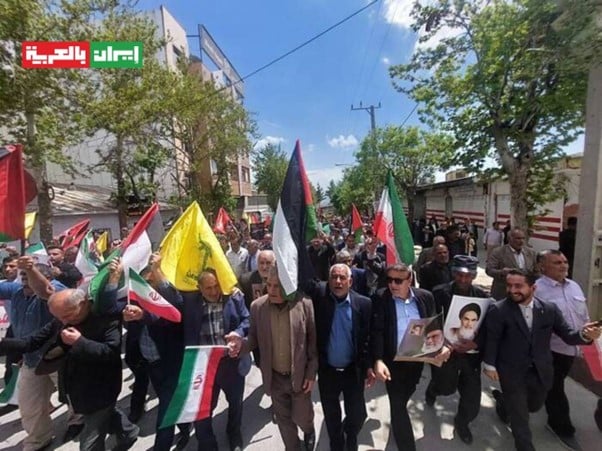
Iran’s Response to the Attack
Iranian civil aviation movement was restricted in the Iranian airspace despite the resumption of commercial flights and the cancellation of restrictions. Iran called for an emergency meeting of the War Council and an emergency session of the Iranian Supreme National Security Council. The Iranian Revolutionary Guards declared a state of maximum readiness at all their bases and military camps across Iran.
So far there are not enough details to know what was attacked and for the level of damage to the Iranians. Meanwhile, Iran through its various media channels, which double as government mouthpieces, have been playing down the attack. This is meant to assuage public reaction in Iran that would view an attack by Israel as severely damaging Iran’s national honor, especially as Iran claims to be leading an international campaign to destroy Israel. Such an admission of fallibility would prompt hardliner in Iran to push for a greater escalation. Another concern of Iran, is that revealing more details of the attack, would expose many holes in the Iranian intelligence and defensive capabilities.
According to official Iranian sources, the Iranian air defense systems succeeded in downing drones/flying objects in the skies of Isfahan. They stated there were “no explosion events on the ground”. Iran made sure to emphasize several times: no damage was caused to nuclear facilities and no missiles were fired towards Iran. Only (small) drones were intercepted.
Iran is likely to rely on this type of disinformation to absolve itself of internal pressure to retaliate directly, and instead rely on their proxy organizations in the region to retaliate.
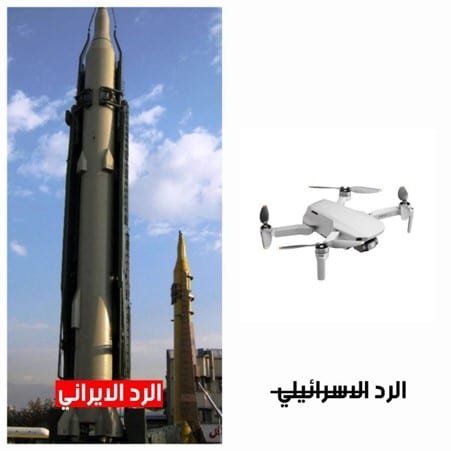
International Reactions to the Israeli attack
- Within Iran, multiple social media sites mocked the Israeli reaction as timid- referring to the fact that Iran struck Israel with missiles while Israel responded with drones. A tweet by Itamar Ben-Gvir, Israeli National Security Minister, calling the alleged Israeli attack “weak” has been translated and echoed on Arab and Iranian networks. The Iranian Tasnim Agency: “The Zionist authorities are mocking themselves.”
Across Iran, demonstrations were carried out in support of the Palestinians and against Israel and the US. This was a message meant to convey “business as usual” and that Iran was not harmed or shaken by the attack. The Iranians will attempt to project domestic strength by bringing many civilians to demonstrations supporting the government across the country to highlight how the Iran was not materially damaged and to minimize the impact of the response attributed to Israel.
- Jake Sullivan, the U.S. National Security Advisor, announced that sanctions will be imposed on Iran in the coming days. The sanctions will target Iran’s missile program and drones, as well as entities supporting the Islamic regime’s military and the country’s Ministry of Defense. Sullivan added that he expects other countries to impose their own sanctions and that the U.S. will continue to strengthen its air defense capabilities to diminish the threat of Iranian offensive capabilities. The U.S. Treasury Department is imposing sanctions on 16 Iranian individuals and entities. Additionally, sanctions are being imposed on 5 companies that supply raw materials to or purchase products from Khouzestan Steel Company, Iran’s largest steel manufacturer.
- The President of France, Emmanual Macron, announced that sanctions would be imposed on Iran for exporting drones and missiles to Russia and the Middle East, and discussions are ongoing about including the Revolutionary Guards on the sanctions list.
- The United Kingdom included 13 new entities under its sanctions against Iran.
- The International Atomic Energy Agency (IAEA) confirmed that no damage was caused to nuclear sites in Iran, amidst reports of an Israeli attack in the country. The IAEA added, “We are closely monitoring the situation and continue to call for maximum restraint from all sides. We reiterate that nuclear facilities must not be a target in military conflicts.”
- Russian Foreign Minister Sergei Lavrov stated that Russia had conveyed a message to Israel that Iran does not intend to escalate the situation after the attack attributed to Israel.
- S. Secretary of State Antony Blinken stated, after a G7 Foreign Ministers’ meeting in Italy amid the reports of the attack in Iran, “We were not involved in any offensive action.” He declined to comment further, even when asked if the U.S. was informed in advance.
- French Foreign Minister, Stéphane Séjourné, and the UK Foreign Minister, David Cameroon came to Israel and urged Israel to show restraint and act “wisely.”
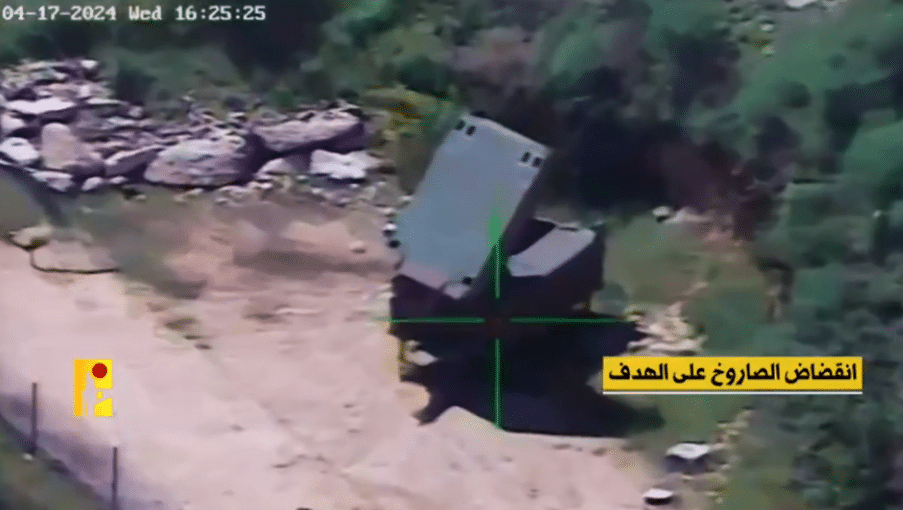
New International Coalition
The Wall Street Journal detailed the genesis and timeline of a new US led, regional Arab coalition which secretly provided the United States with intelligence information on Tehran’s attack plan, opened their airspace to American fighter jets, and shared radar data revealing Iranian drones and missiles. This is a remarkable development that shows that despite the rhetoric, regional actors are very practical in their policy appreciating that their relationship with Israel is an asset against a rogue, Iranian regime. Publicly, they had to deny their security cooperation with Israel to assuage public anger against such a collaboration.
In March 2022, the Commander of CENTCOM convened a secret meeting in Sharm El-Sheikh with military representatives from Israel and Arab states to exploring coordination options among all forces in the region. Adding Israel to CENTCOM following the Abraham Accords ushered in a regional coordination mechanism that became known as MEAD – Middle East Air Defense, to counter the aerial threat by Iran.
This coalition’s inaugural action was responding in coordination to Iran’s attack against Israel. The U.S. pressured Arab states to share intelligence regarding Tehran’s plans. Saudi Arabia and the UAE agreed to share information to American forces, including real-time classified information. Jordan agreed to open its airspace to American and other countries’ fighter jets and even to intercept Iranian projectiles themselves. Two days before the attack, official sources in Iran updated their counterparts from Saudi Arabia and the Gulf states about the nature and timing of the expected attack. The information was passed to the U.S., allowing Israel to receive an early warning.
As soon as the drones and missiles were launched from Iran, they were detected by radars in the Gulf states – connected to the CENTCOM operations center in Qatar, which relayed the information to fighter jets on standby in the Middle East airspace.
International
- Israeli Foreign Minister Israel Katz met with the German Foreign Minister, Annalena Baerbock, and the British Foreign Minister, David Cameron, and thanked them for their assistance in intercepting the Iranian attack and for standing with Israel. “Now is our opportunity to change the region, to call the Revolutionary Guards by their true name – a terrorist organization, and to impose sanctions on Iran’s missile project.”
- Turkish Foreign Minister, Hakan Fidan, met in Qatar with the head of Hamas’s political bureau, Ismail Haniyeh. According to a Turkish source, the two discussed the supply of humanitarian aid to the Gaza Strip and the efforts to agree on a ceasefire and the release of hostages. On Saturday, Turkey’s President Recep Tayyip Erdogan and Hamas chief Ismail Haniyeh met in Istanbul. There are reports that Turkey is considered a likely host country for Hamas’ political bureau should Qatar expel it. This could pose a danger because Hamas would be under the umbrella of a NATO ally and could use Turkey’s international legitimacy to whitewash its activities in a similar manner to how Hamas has abused the UN’s institutions.
Turkey has already hosted Hamas’ senior leadership in the past, most notably Saleh Al Arouri, Hamas’ number 3 and initiator of its Lebanon branch, who orchestrated attacks in Judea and Samaria from Turkish soil by recruiting Israeli Arabs and Palestinians. - The G7 Foreign Ministers’ Statement following the Iranian attack read as follows: “We commit to closely coordinating to undermine Iran’s ability to acquire, produce, or transfer arms.” President of the European Council Charles Michel added they will “focus on sanctions against Iranian companies producing drones and missiles.”
- The United States vetoed the UN resolution recognizing Palestine as full UN member state. Apart from the UK and Switzerland, which abstained, and the United States, which opposed, all countries supported the Palestinian request. The PA said that it would revaluate its ties with the US after the vote took place.

- The Iranian attack also created an interesting rift between Jordan and Iran, with Jordan’s Foreign Minister, Ayman Safadi, meeting with Iranian Foreign Minister Hossein Amir Abdollahian on the sidelines of the UN Security Council discussions. After the meeting, Safadi stated: “Jordan will not allow itself to become a battleground between Iran and Israel.” Jordan participated in intercepting Iran’s missile and drone attack and allowed Israel to used its airspace to do so. Safadi tried to play down this collaboration by stating they down any threat to Jordanian soil, and would have done so “also in case drones came from Israel” to attack Jordan.
- American and Saudi sources told The Wall Street Journal that the Biden administration is advancing a long-term diplomatic agreement in the coming months and is pressuring Prime Minister Benjamin Netanyahu to commit to the establishment of a Palestinian state – in exchange for diplomatic recognition from Riyadh. According to the report, the White House is offering Saudi Arabia a closer relationship with Washington in exchange for normalizing relations with Israel, alongside assistance in acquiring civilian nuclear power and a renewed push for a Palestinian state. According to official sources in the USA, the negotiation is currently in its “final stages.”
- Algeria announced a special contribution of 15 million dollars to UNRWA. This followed a special discussion in the UN Security Council about UNRWA’s situation, initiated by Jordan’s request.
- Qatar’s Prime Minister, Mohammad bin Abdulrahman Al-Thani, stated that Qatar is “reassessing its role as a mediator between Israel and Gaza.” He mentioned, “Our role is being exploited by politicians for their purposes.” He added, “We had extensive contacts with Tehran and Washington to contain any escalation. We hear from all parties in the region that they do not want war – the best way to reduce escalation in the region is to stop the war in Gaza.” Later, it was reported that Hamas leaders may potentially leave Qatar to set up their operations in a different host country, likely candidates are Oman or Turkey.This could also present Israel with some strategic opportunities to diminish the leverage Qatar currently has in the hostage negotiations, and reinstate Egypt’s traditional role in these mediations – preferring its important and influential neighbor with historic influence over Hamas on a Muslim brotherhood-affiliated regime that is harboring Hamas’ senior leadership.
US-Israel Talks
Progress was made during the week on the issue of the American acceptance of the pending IDF attack in Rafah. In the aftermath of Iran’s attack of Israel, a quick international consensus which had been elusive began to coalesce around the Israeli plans as Israel continued to prepare for that eventuality., The broad international appreciation for Israel’s legitimate desire to effectively respond to the Iranian provocation, has led to a growing reluctant acceptance of an Israeli response in Rafah as preferable to a more robust and public Israeli in Iran itself. The Biden Administration has expressed the sentiment, in the aftermath of the April 14 attacks, that Israel should ‘take the win,’ referencing the fact that 99% of the projectiles sent towards Israel failed to reach their targets, in an attempt to prevent an Israeli counterstrike as part of the Biden Administration to “cool down” the tensions.
Israel Aid Bill
Over the weekend, the US House of Representatives managed to pass an aid bill that would provide over $17 Billion in aid for Israel, and an additional $9 billion humanitarian relief to in Gaza as well as other war-torn regions. The final decision on the allocation of funds will be up to the White House, with analysts expecting roughly $2 billion to be dedicatedto Gaza.
The Senate is expected to pass the measure next week, when it will be sent to Biden to sign into law. Breaking down the aid to Israel, which includes $5.2 billion for the replenishment and expansion of Israel’s missile and rocket defense system; another $3.5 billion towards the purchasing of advanced weapons systems; $1 billion to enhance weapons production; $4.4 billion for other defense supplies and services provided to Israel; and $2.4 billion to bolster US operations in the region amid the Gaza war.
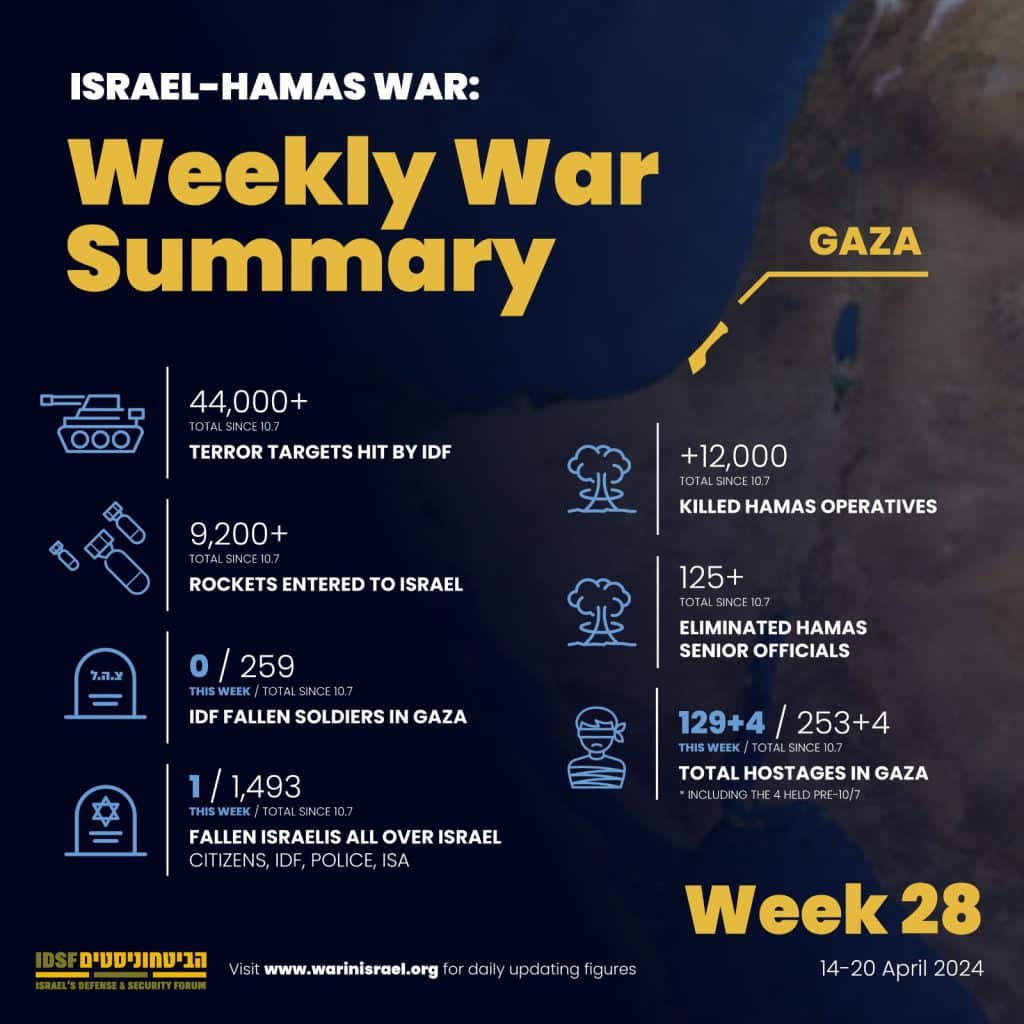
Gaza Strip
Diplomatic
On ‘Palestinian Prisoners Day,’ Hamas and elements within the Palestinian Authority continue to employ “reverse public relations” tactics, leveraging the day to push for a more favorable Israeli hostage/Palestinian prisoner exchange deal that would include the release of more Palestinian prisoners. Wide-ranging demonstrations in support of Palestinian prisoners took place across Palestinian controlled areas of Judea and Samaria and in Gaza. Hamas is calling for the escalation of terrorist activities to secure the release of Palestinian prisoners. Additionally, Hamas is urging human rights organizations to expose Israel’s “war crimes” and to prosecute its leaders for committing and enabling war crimes. Hamas is trying to influence global public opinion by falsely claiming that Israel is committing a “genocide” in Gaza and that the world should treat Israel as if it has a history of conducting war crimes in the past.
In a statement from Hamas, it was reported: “The administration of the occupation’s prison continues to practice the most abominable crimes against prisoners in jails and detention centers, including medical negligence, torture, and direct killing…”.
This comes after Hamas rejected the last offer for a hostage deal and was thereby criticized by the US for doing so. US State Department spokesperson Matthew Miller, said, “This deal, which Hamas has rejected, would allow for an immediate cease-fire in Gaza lasting at least six weeks, benefiting the Palestinian people whom Hamas claims to represent”. Brett McGurk, White House coordinator for the Middle East said, “There was a deal on the table and it was completely rejected by the Hamas leadership in Gaza.” The US is slowly coming to the conclusion that Hamas is just trying to buy time and has not approached the negotiations seriously. Hamas is instead using its façade of pushing for a deal and not caving to the Americans and Israelis, to bolster its image on the ‘Palestinian street.’

Operational
The IDF’s 162nd Division is advancing and is in the process of clearing the central Gaza Strip and establishing Israeli control in its north: The regular 401 Armored Brigade unit has built a bridge over the Gaza Stream to allow more heavy vehicles to cross southwards into the central Gaza Strip complimenting the two existing bridges.
Meanwhile, the Nahal Brigade is preparing to capture the Nuseirat Camp. During the fighting, they uncovered a wide area containing rocket launchers that were ready to be fired into Israeli territory, which were promptly destroyed. Over the week, the division eliminated 40 terrorists and destroyed over 100 terror infrastructures (including Hamas and Islamic Jihad positions for rocket production and long-range rockets, among other combat means). They located 17 tunnel shafts and rocket launchers, including underground launchers. The fighters destroyed an underground complex that allowed terrorists to move between the center and north of the Strip beneath the Gaza Stream and destroyed it.
The Institute for the Study of War (ISW) reports that, based on a satellite image analysis, IDF bulldozers are flattening the village of Az-Zahra, located slightly north of the Nuseirat Camp. From this village, the terrorists had moved between the center and north via underground tunnels.
Two reserve brigades have been mobilized to defend the Netzarim corridor and the American port, allowing the regular brigades to complete the conquest of the central camps. According to ISW, there is at least one functional Hamas battalion in the center (possibly even two) and remnants of other battalions fighting the IDF, including those responsible for firing mortars towards the Netzarim corridor and the Gaza envelope.
The IDF reported that the positions along the Netzarim corridor, from which the soldiers launch raids northwards and into the center, in recent weeks, have resulted in the elimination of over 1,000 terrorists and the destruction of 20 km of tunnel infrastructure or other underground complexes.
The IDF’s Northern Gaza Brigade of the Gaza Division has been conducting operations in recent days to clear the area around Beit Hanoun and create a buffer zone of 1 km from the security fence. Recently, they also raided a school where terrorists were hiding among the civilian population. The Air Force eliminated a Hamas security officer in the intelligence unit responsible for investigations in the Hamas Beit Hanoun battalion.
Preparations for Maneuver in Rafah
Following misleading announcements by Hamas to prevent Gazans from fleeing Rafah and seeking shelter elsewhere, masses of Gazans attempted to return to the north of the Strip but were dispersed by Hamas using crowd control methods such as tear gas and warning shots, and did not cross the Besor Stream northwards. The IDF Arabic spokesperson called on residents not to believe the rumors and lies of Hamas, to evacuate only to Khan Yunis or the central camps, and that the north remains an active war zone and to comply with IDF instructions. It was reported that two refugee tent camps have been set up in the Khan Yunis area, with additional camps being established under the supervision of the Egyptian Red Crescent to manage the lives of the displaced and distribute food and other humanitarian supplies, a step on the way to the final maneuver.
Signs of Rehabilitation
The Municipality of Bani Suheila has reopened the roads in the city located east of Khan Yunis, after clearing most of the debris caused by the ground maneuver and airstrikes. Similar videos are emerging from other locations in the Gaza Strip. The Palestinians have begun restore the infrastructure, and residents are returning to their homes, including in the northern part of Gaza. There are other videos coming from Gaza showing a limited return to “business as usual” with videos of thousands of Gazans playing on the beach. It seems that the war in Gaza has dramatically paused, except for specific targeted IDF operations in the central camps. Since the two objectives set by the political echelon – the return of the hostages and the destruction of Hamas have not yet been achieved, it would be unwise for anyone to interpret the lull in hostilities as the end of the war.
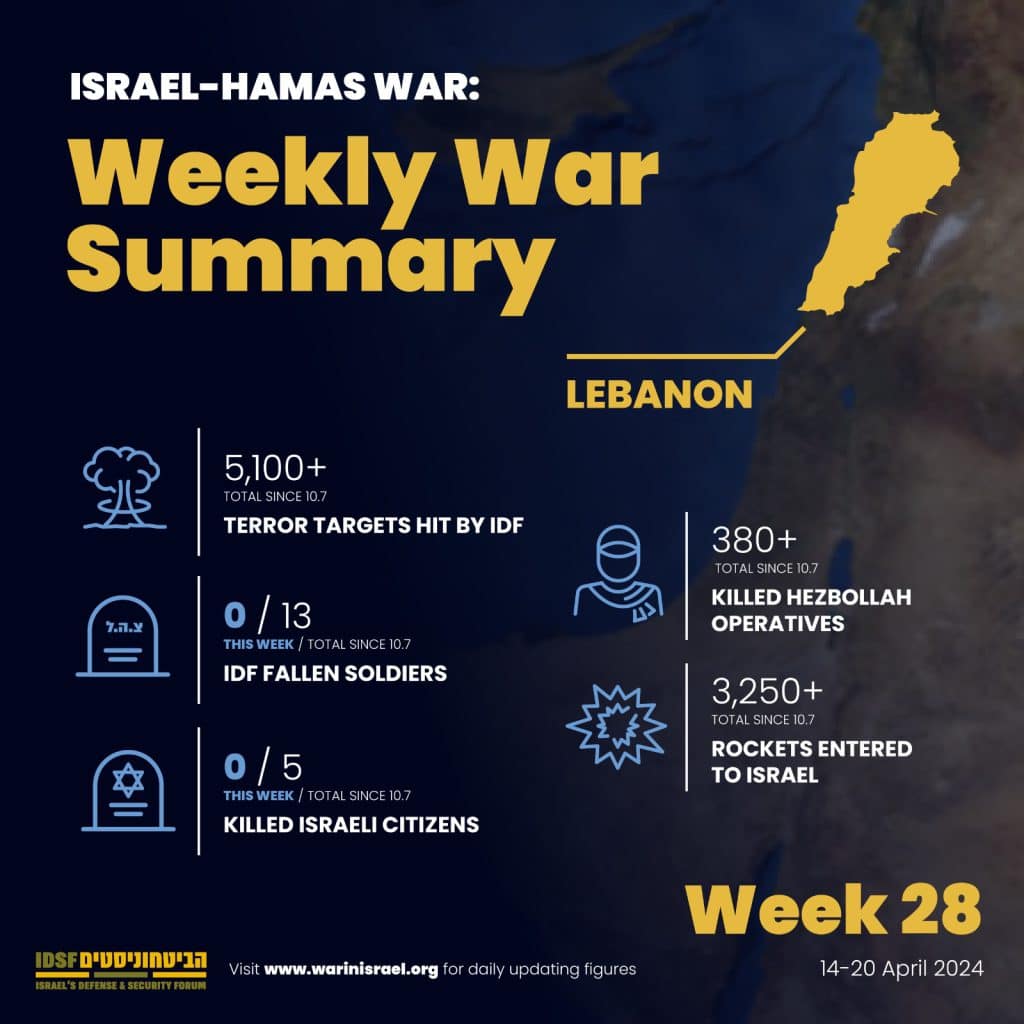
Lebanon
Operational
- Hezbollah launched two suicide drones in an attempt to strike the Iron Dome batteries at the Beit Hillel Base. The batteries were not damaged, but there was some property damage and 3 civilians were injured in the shooting. The IAF retaliated by attacking numerous targets, eliminating the commander of Hezbollah’s Coastal Sector (equivalent to a brigade commander) who was responsible for rocket and anti-tank missile fire towards the north of the country, as well as the commander of the missile and rocket unit of the Radwan (elite commando) Force.
- Hezbollah fired a barrage of rockets and anti-tank missiles towards the air control base on Mount Meron, followed by a rocket barrage towards the town of Elkosh in the Upper Galilee.
- Hezbollah fired anti-tank missiles and suicide drones towards the town of Arab al-Aramshe, located a few hundred meters from the border with Lebanon. A drone hit a community center where soldiers and civilians were gathered, injuring 18 people, including 4 civilians (two of them in serious condition) and 14 soldiers ( 6 in serious condition). This was a lethal strike by Hezbollah, posing a risk of similar attacks deep into the Galilee.
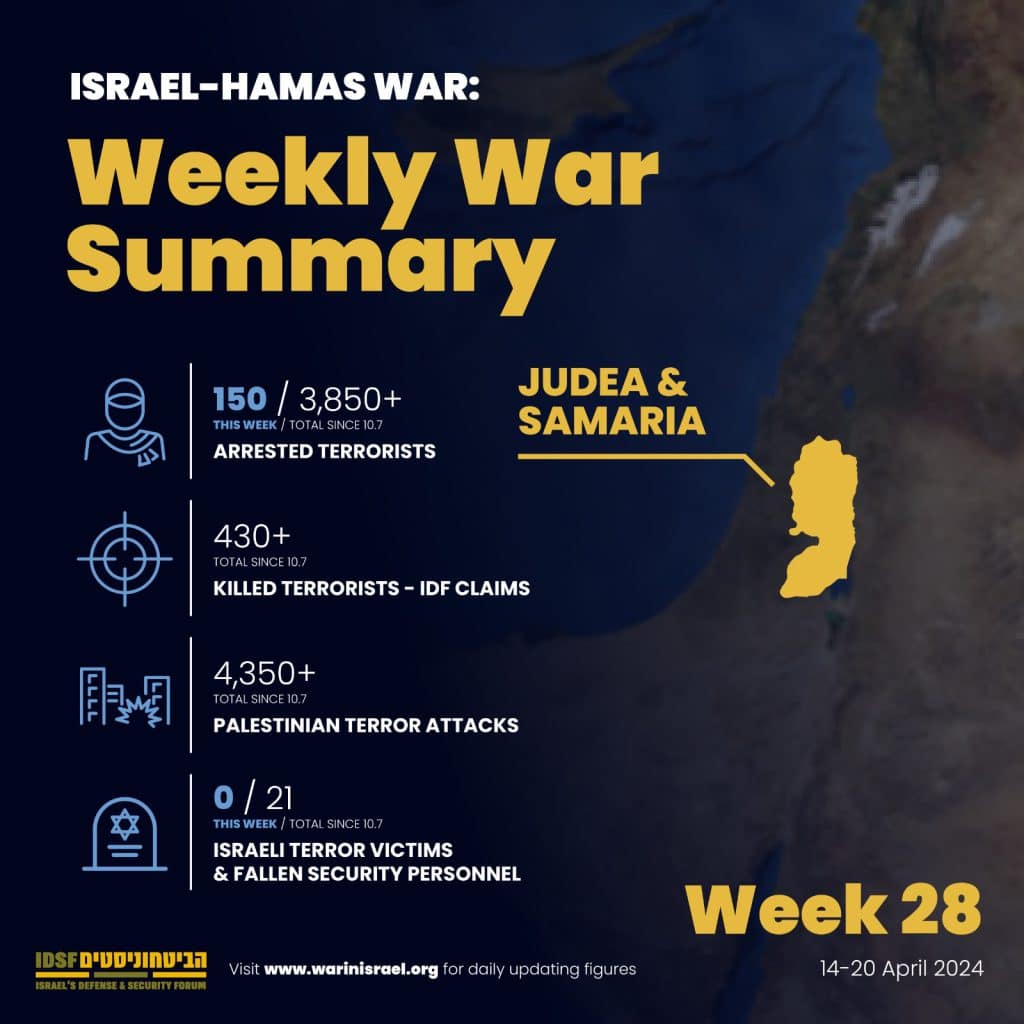
Judea and Samaria
- Mohammad Mustafa, the Prime Minister of the Palestinian Authority and Minister of Foreign Affairs, made an official visit to Algeria, meeting Algerian President Abdelmadjid Tebboune, Prime Minister Abdelaziz Djerad, and Foreign Minister Sabri Boukadoum. In his meeting with the President of Algeria, Mustafa praised the Algerian efforts in international forums, especially at the UN Security Council, and their ongoing efforts to gain consensus for ending the war in the Gaza Strip, supporting the full membership of the Palestinian Authority at the UN, and recognizing the Palestinian state.
- Mustafa also met with Mikhail Bogdanov, the Deputy Foreign Minister of Russia. The meeting emphasized the need to mobilize efforts to end the war in the Gaza Strip and to introduce humanitarian aid. Bogdanov highlighted his principal position supporting the Palestinian Authority’s request for full membership in the UN.
- Near the village of Qusra, a Jewish shepherd reported hearing shots possibly fired at him; no injuries were reported. The shepherd identified a suspect who fled the scene and is under investigation by the IDF.
- Undercover officers from the Jerusalem Border Police, directed by the Shin Bet arrested an ISIS operative in Beitunia, who planned to carry out an attack in the immediate timeframe. ISIS incitement targets Palestinian “lone wolves” who are not members of Hamas or Islamic Jihad. From a religious standpoint, as Salafis, they are more extreme and do not see the Palestinian national movement as valuable. While Hamas believes that jihad should be carried out to leverage the Palestinian national movement towards establishing an Islamic Caliphate, according to ISIS and aligned Salafist groups, there is no place for any sovereign state, there is no Palestinian nation, only the pursuit of an Islamic Caliphate through Jihad.
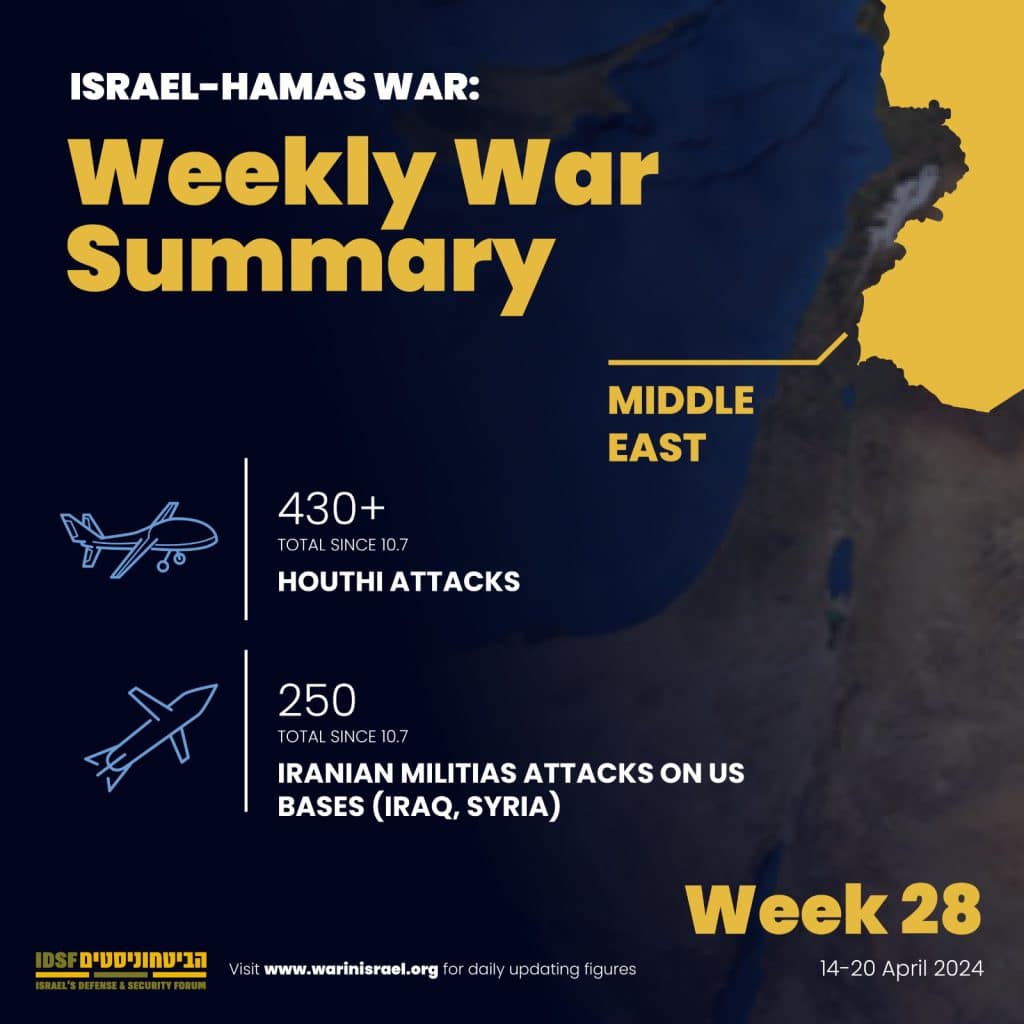
Global Jihad
In response to the celebrations across the Shia world following the Iranian attack on Israel ISIS called for Sunni Muslims who support the organization to incite a resurgence of Jihad in Jerusalem and “Palestine”. While ISIS does not want the Iranian attack to lead to the strengthening of Shia forces at the expense of the Jihadist momentum that has materialized following the October 7 massacre, ISIS does consider this development as a threat because the extremist Salafi organization categorizes Shias as “infidels” along with Jews and Christians. Yet at the same time, it seeks to capitalize on the Jihadist momentum created by Hamas following October 7, to recruit supporters and carry out more attacks against the attacking and murdering Jews of Muslims there.” Additionally, ISIS perceives an Iranian-Shia strengthening as a threat since it could lead to their control over the Al-Aqsa Mosque and Jerusalem, which is a holy site for Sunni Muslims, while in the eyes of Shias, it is only the third most important city after Mecca and Medina is Najaf in Iraq.
A recent ISIS statement reiterated their approach: “What is happening in Jerusalem, of Jews attacking and killing Muslims there, obliges the supporters to participate in the duty of incitement of Jihad for the sake of the Almighty there, and to clarify to the people that we fight for the sake of the Almighty not for the tyrant…Do not allow the Shias and infidels to ride the wave. Jerusalem is for the Muslims, and its people are our people.”
Iraq and Syria
- There appear to be indications of defensive preparations and the anticipation of an attack. The Iranian Revolutionary Guards is taking emergency measures at their facilities across Syria. Iran began to evacuate its workers from various sites in Syria, and the Iranian Revolutionary Guards along with Hezbollah are reducing the presence of their senior officers in Syria could indeed be interpreted as preparations for a potential military escalation or in response to a perceived threat.
- Iraqi Prime Minister Al-Sudani met with President Biden in Washington, where Al-Sudani declared a “360-degree strategic partnership” with the United States, marking a significant development if implemented.